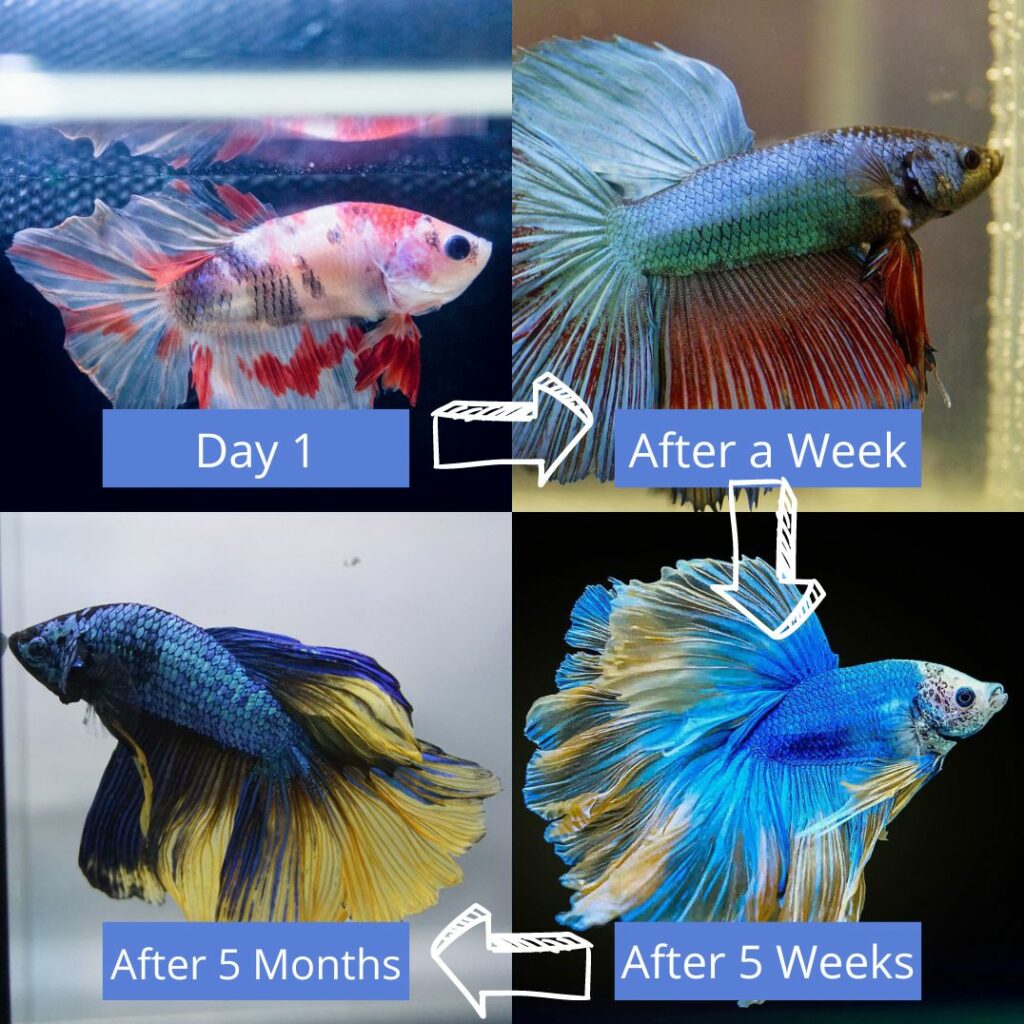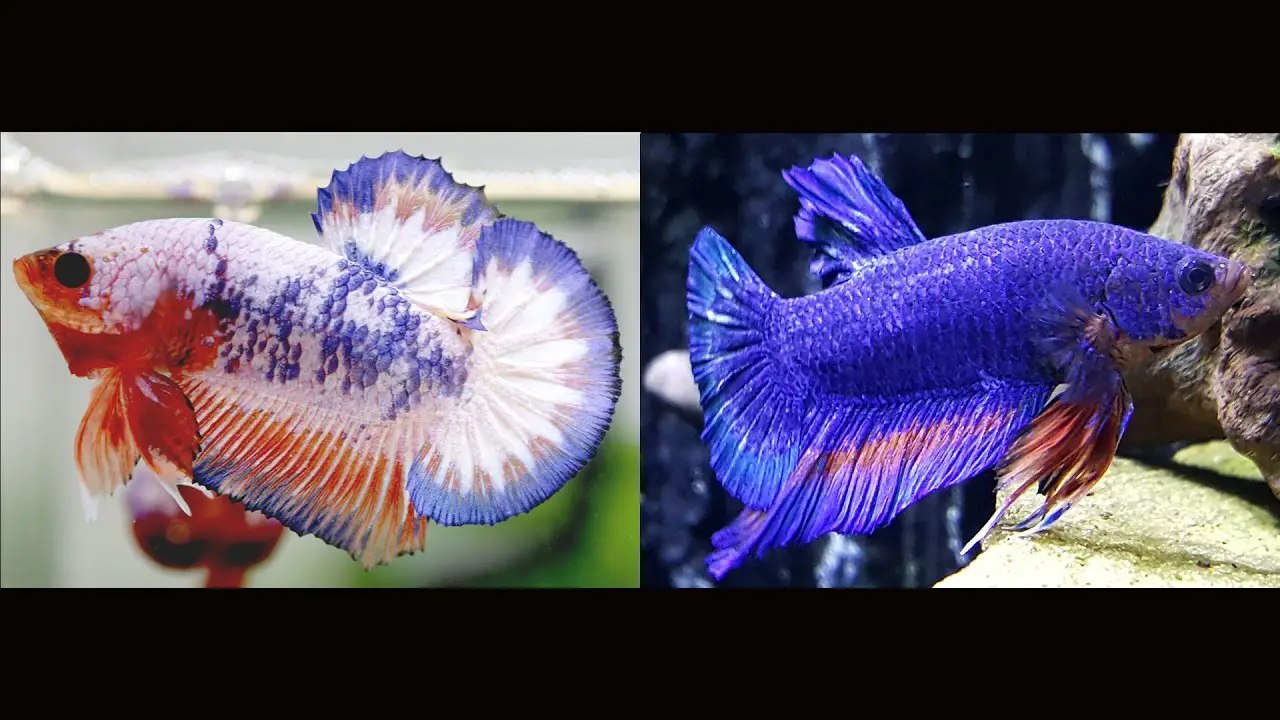Betta fish are known for their vibrant colors and stunning patterns. These fish can change colors, and this can be a cause of concern for many pet owners. But why do betta fish change color? Is it natural, or is there something wrong with the fish?
There are many reasons why betta fish change color. Some of the most common reasons include stress, age, and health issues. Understanding the reasons behind color changes in betta fish can help pet owners provide the best care for their beloved pets. In this article, we will explore the different factors that can affect the color of betta fish and what pet owners can do to ensure their fish remain healthy and happy.

Why Do Betta Fish Change Color?
Betta fish are known for their vibrant and diverse colors, making them a popular choice among fish enthusiasts. However, have you ever wondered why betta fish change color? In this article, we will explore the various reasons behind betta fish color change and what it means for their health and well-being.
Genetics
Betta fish come in a variety of colors, including red, blue, green, yellow, and purple. These colors are determined by genetics, with each betta fish having a unique genetic makeup that determines its coloration. Some bettas are bred specifically for their colors, resulting in more vibrant and striking hues. Additionally, different betta fish species have different color variations, making them even more unique.
Genetics can also play a role in color change. As betta fish age, their colors may fade or change due to genetic factors that cause pigment loss. This is a natural and normal process, and does not necessarily indicate any health issues.
Stress
Stress is a common cause of betta fish color change. When bettas are stressed, they may become pale or lose their vibrant colors. This can be due to a variety of factors, including poor water quality, overfeeding, overcrowding, or sudden changes in water temperature or pH levels. It is important to monitor the water conditions in your betta fish tank and make adjustments as needed to reduce stress and maintain healthy coloration.
Illness
Illness can also cause betta fish color change. Some common illnesses that can affect bettas include fungal or bacterial infections, parasites, and fin rot. These conditions can cause discoloration, loss of scales, or other physical changes in your betta fish. If you notice any changes in your betta’s coloration, along with any other abnormal behaviors or symptoms, it is important to seek veterinary care as soon as possible.
Mood
Believe it or not, betta fish can change color depending on their mood. When a betta fish is happy and content, it may display more vibrant colors and patterns. Conversely, when a betta is stressed or agitated, it may become paler or change color altogether. This can be a helpful indicator of your betta’s overall well-being, as well as a fun way to observe and interact with your fish.
Breeding
Breeding can also play a role in betta fish color change. When betta fish are bred, their offspring may inherit color traits from both parents, resulting in unique and varied coloration. Additionally, some breeders may selectively breed bettas for specific colors or patterns, resulting in more uniform and consistent coloration in their offspring.
Benefits of Betta Fish Coloration
The vibrant and diverse colors of betta fish are not only aesthetically pleasing, but can also provide important benefits for their overall health and well-being. For example, bettas with brighter colors may be more attractive to potential mates, increasing their chances of successfully breeding. Additionally, bettas with more vibrant colors may be less likely to be targeted by predators, as their bright hues can serve as a warning sign of toxicity or danger.
Betta Fish Color vs. Sex
It is important to note that betta fish coloration is not necessarily indicative of their sex. While male bettas are typically more colorful and vibrant than females, this is not always the case. Additionally, some female bettas may display bright colors or patterns, making it difficult to distinguish their sex based on color alone.
Color Enhancing Foods and Supplements
If you want to enhance or maintain your betta’s coloration, there are several foods and supplements available that can help. These products often contain ingredients like spirulina or astaxanthin, which can help boost betta fish coloration and overall health. However, it is important to use these products in moderation and according to the manufacturer’s instructions, as overfeeding or overdosing on supplements can be harmful to your betta fish.
Conclusion
In conclusion, betta fish change color for a variety of reasons, including genetics, stress, illness, mood, and breeding. While color change is a natural and normal process, it is important to monitor your betta fish’s coloration for any sudden or drastic changes that may indicate health issues. By providing a healthy and stress-free environment, you can help maintain your betta’s vibrant and diverse coloration for years to come.
Frequently Asked Questions
Here are some common questions related to why Betta fish change color:
Why do Betta fish change color?
Betta fish are known for their vibrant colors and changing colors is a normal and healthy behavior for them. They change color as a response to their environment, mood, breeding, and age. The amount of light, temperature, and water quality also plays a role in their color changes.
Betta fish have special pigment cells called chromatophores that allow them to change color. These cells can expand and contract, causing the Betta’s color to change. The color change may be subtle or drastic depending on the situation.
What is the most common reason for Betta fish to change color?
The most common reason for Betta fish to change color is due to their mood. When they are happy and healthy, they will show brighter and more vibrant colors. On the other hand, when they are stressed, sick or unhappy they will show duller and darker colors. A Betta fish may also change color when it is breeding as part of its natural mating behavior.
If you notice changes in your Betta’s color, it’s important to check their environment, water quality, and diet to ensure they are healthy and happy. If their color changes persist, it’s best to consult with a veterinarian who specializes in fish care.
Can Betta fish change color as they age?
Yes, Betta fish can change color as they age. As they grow older, they may lose some of their vibrancy and become paler in color. This is a natural process that occurs as they age. However, if you notice sudden or drastic changes in your Betta’s color, it may be a sign of an underlying health issue and should be checked by a veterinarian.
It’s important to note that Betta fish have a lifespan of 2-3 years and their color changes may be a sign of their aging process. Providing a healthy and stress-free environment can help to prolong their lifespan and maintain their color for longer.
What can I do to maintain my Betta fish’s color?
To maintain your Betta fish’s color, it’s important to provide them with a healthy and stress-free environment. This includes regular water changes, a balanced diet, and a suitable tank size and temperature. Ensure that the water quality is optimal, as poor water quality can cause stress and affect their color.
You can also provide your Betta with a variety of hiding spots, plants and decorations in their tank. This will help to create a comfortable and stimulating environment for them, which can improve their mood and color.
Can stress cause Betta fish to change color?
Yes, stress can cause Betta fish to change color. When Betta fish are stressed, they may show duller and darker colors. Stress can be caused by a variety of factors such as poor water quality, inadequate tank size, aggressive tank mates or sudden changes in their environment.
If you notice changes in your Betta’s color, it’s important to identify and address the cause of their stress. Providing a comfortable and stress-free environment with appropriate hiding spots and tank mates can help to maintain their color and overall health.

Why betta fish change color? 💛💚💙💜 Marble Bettas
In conclusion, the color-changing ability of betta fish is a remarkable and fascinating phenomenon. These fish are truly unique in their ability to change their colors based on their mood, environment, and health. Understanding the reasons behind this behavior can provide insights into the complex and intricate world of these beautiful creatures.
From the discussion above, it is clear that betta fish change their color for a variety of reasons. Whether it is to blend in with their surroundings, attract a mate, or communicate with other fish, the ability to change color is an essential part of their survival and reproduction. By understanding the underlying mechanisms behind this behavior, we can gain a deeper appreciation for these amazing creatures.
In the end, the color-changing ability of betta fish is just one of the many fascinating aspects of these creatures. By learning more about these fish and their behavior, we can deepen our understanding of the natural world and the complex interactions that make up our ecosystem. So the next time you see a betta fish changing colors, take a moment to appreciate the wonder and beauty of this incredible creature.
